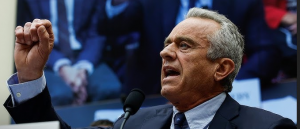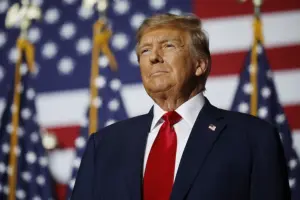As President-elect Donald Trump prepares for his upcoming administration, the nomination of Robert F. Kennedy Jr. as Secretary of the Department of Health and Human Services (HHS) is causing a stir in Washington. Kennedy, an acclaimed environmental attorney and noted vaccine skeptic, faces extensive scrutiny from lawmakers this week during a series of crucial meetings.
Trump's HHS Secretary Nomination Sparks Controversy Over Vaccine Skepticism

Trump's HHS Secretary Nomination Sparks Controversy Over Vaccine Skepticism
Robert F. Kennedy Jr.'s nomination has ignited debates over public health policies as he prepares for Senate meetings regarding his confirmation.
Kennedy's confirmation process includes engagements with various senators, notably Senator Bill Cassidy (R-LA), who is poised to become the chair of the Senate Health, Education, Labor, and Pensions (HELP) Committee. His discussions scheduled for Thursday with Republican aides will serve as an essential evaluation of his plans for the HHS.
The nomination has already drawn fire due to Kennedy's controversial stance on vaccines and public health measures, especially his promotion of debunked theories linking vaccines to autism. Furthermore, his recent comments regarding fluoridation have alarmed numerous health professionals. In a statement shared on X (formerly Twitter), he suggested the impending Trump administration would recommend the removal of fluoride from U.S. water systems, a move that sparks concerns over potential damage to public health, particularly among underprivileged communities.
Kennedy’s historical opposition to accepted public health practices raises significant questions about his suitability for leading HHS. Critics argue that his proposal to eliminate fluoride could disproportionately affect those lacking adequate dental resources, while Republicans are tasked with balancing Kennedy's environmental advocacy with his contentious health policy views.
Supporters of Kennedy argue that his readiness to challenge established norms is what could benefit the role of HHS Secretary. His reputation as an environmental lawyer, where he has fought against corporate pollution, is often cited as a testament to his capability for accountability and reform.
Kennedy's upcoming meetings with senators stand at the center of his nomination process, as they will likely serve to assess his ability to navigate the political landscape while affirming the confidence of both the Trump administration and Senate Republicans amidst the growing concerns about his policy beliefs.
The nomination has already drawn fire due to Kennedy's controversial stance on vaccines and public health measures, especially his promotion of debunked theories linking vaccines to autism. Furthermore, his recent comments regarding fluoridation have alarmed numerous health professionals. In a statement shared on X (formerly Twitter), he suggested the impending Trump administration would recommend the removal of fluoride from U.S. water systems, a move that sparks concerns over potential damage to public health, particularly among underprivileged communities.
Kennedy’s historical opposition to accepted public health practices raises significant questions about his suitability for leading HHS. Critics argue that his proposal to eliminate fluoride could disproportionately affect those lacking adequate dental resources, while Republicans are tasked with balancing Kennedy's environmental advocacy with his contentious health policy views.
Supporters of Kennedy argue that his readiness to challenge established norms is what could benefit the role of HHS Secretary. His reputation as an environmental lawyer, where he has fought against corporate pollution, is often cited as a testament to his capability for accountability and reform.
Kennedy's upcoming meetings with senators stand at the center of his nomination process, as they will likely serve to assess his ability to navigate the political landscape while affirming the confidence of both the Trump administration and Senate Republicans amidst the growing concerns about his policy beliefs.




















